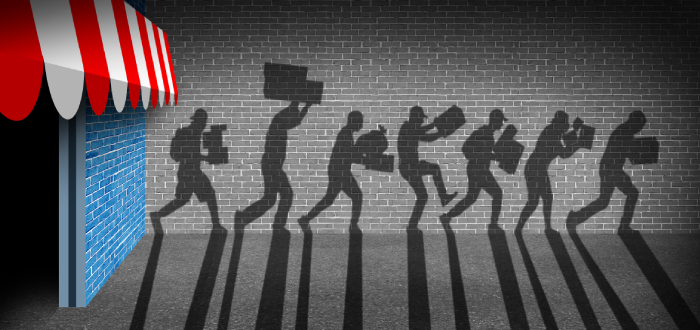Shoplifting (a form of theft under Texas law) is one of the most common crimes in Houston and throughout Texas. Most shoplifting cases filed in the Houston are misdemeanors allegedly committed by first-time offenders. But what happens if you are arrested for shoplifting and have a prior conviction for shoplifting? How are repeat shoplifters charged in Texas?
How is repeat shoplifting charged in Texas?
Under Texas law, shoplifting is considered a type of theft (there is no crime known as “shoplifting” but we will talk about shoplifting here to discuss a particular kind of theft). As explained below, under Texas Penal Code 31.03, the penalties for shoplifting can be increased if a person has a prior theft conviction.
In Texas, the seriousness of a shoplifting arrest is based on the value of the items that were stolen. In Texas, a first-time shoplifting arrest is charged as follows:
- Shoplifting is charged as a Class C Misdemeanor if the value of the property stolen is worth $100 or less and is punishable by a fine up to $500.
- Shoplifting is charged as a Class B Misdemeanor if the value of the property stolen is more than $100 but less than $750 and is punishable by up to 180 days in jail and/or a fine up to $2,000.
- Shoplifting is charged as a Class A Misdemeanor if the value of the property stolen is $750 or more but less than $2,500 and is punishable by up to 180 days in jail and/or a fine up to $4,000.
- Shoplifting is charged as a State Jail Felony if the value of the property stolen is $2,500 or more but less than $30,000 and is punishable by 180 days to two years in state jail and/or a fine up to $10,000.
If a person has one or two prior convictions for theft, the potential punishments for a shoplifting arrest can be increased: If a person has one prior conviction for theft and is accused of shoplifting any amount under $750, the person would be charged with a Class “B” misdemeanor. In other words, shoplifting with one prior conviction will be charged as a Class “B” misdemeanor even if only a small amount of merchandise is at issue.
If a person has two prior shoplifting convictions, a third arrest will be charged as a State Jail Felony for shoplifting any amount under $2500. That means that a person with two theft convictions would face a felony for shoplifting any amount (even a small amount that would normally be charged as a Class “C” misdemeanor).
It is important to remember that to be considered a “repeat” shoplifter in Texas (and be subject to the increased penalties mentioned above), you must have one or two final convictions on your record. For example, if your prior theft charge was dismissed, or if you successfully completed a prior deferred adjudication for theft, you would not be subject to the increased penalties.
What happens if you get caught shoplifting multiple times from the same store?
If you have previously been caught shoplifting at a store, it is likely that you have received notice that you may not return. If you are accused of shoplifting from the same store after you have been banned, it is possible that you could face a trespassing charge in addition to a shoplifting charge. If you have been banned from any store, it is highly advisable to obey the ban and avoid going to the store for any reason. As more and more stores are using facial recognition technology, it is highly likely that you could be identified and face additional legal troubles.
What are the consequences of a shoplifting record?
Other than the direct consequences of a criminal case, a shoplifting record can make it very difficult to find work, obtain housing or some types of student loans. Additionally, a shoplifting conviction can be used against you in a custody dispute or present major problems for an immigration case. As can be imaged, these “secondary” problems only get worse with a second conviction.
How can I clean my record after shoplifting?
The best way to clean your record after a shoplifting arrest is to do everything possible to avoid being found guilty. If you have a final conviction for shoplifting on your record, you cannot get the incident sealed or expunged and it will stay on your record permanently. If you accepted a jail sentence or a “time served” on a shoplifting charge, it is likely that you have a final conviction on your record. An experienced criminal defense lawyer can tell you if a shoplifting charge on your record is a shoplifting conviction and what your options might be to clean your record.
In general, there are two ways to clean your record after a shoplifting arrest: an expunction or a petition for non-disclosure (also known as “sealing” your record). An expunction of a shoplifting arrest is the best way to clean your record since it results in all records of the arrest being physically destroyed. However, you are typically only eligible to have your arrest expunged if your case was dismissed or if you were found “not guilty” at trial (the one exception is that a Class “C” deferred adjudication probation for theft may be expungable if completed successfully).
If you completed a deferred adjudication probation for shoplifting, you will not be eligible for an expunction (unless it was for a Class “C”) but you may be eligible to have your records sealed. Getting a shoplifting arrest sealed results in records of the arrest not appearing on most private criminal history searches. Although getting your records sealed is not as good as an expunction, it is still a good option for many people as it prevents most employers from seeing the arrest.
If you have been arrested for shoplifting anywhere in the Houston area, call Ceja Law Firm today. Our attorneys can help you understand your situation, your options and what you can expect from a case. Protecting your freedom and your record is always the goal.










